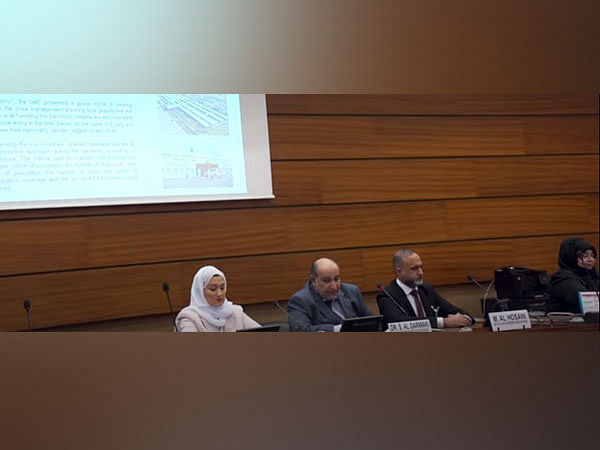[ad_1]

The UAE highlights its humanitarian role and health response to the COVID-19 pandemic. (Image source – WAM)
Geneva [Switzerland]17 May (ANI/WAM): The Permanent Mission of the United Arab Emirates to the United Nations and International Organizations in Geneva, in coordination with the Standing Committee on Human Rights, organized a workshop during the 43rd session of the United Nations Universal Periodic Review Human Rights Working Group.
The seminar titled “Health Response to the COVID-19 Pandemic and the UAE’s Humanitarian Role at the National, Regional and Global Levels” discussed issues related to the COVID-19 health response, with the UAE delegation demonstrating the country’s The pandemic as a unique model and inspiring global success story.
Speakers noted that the UAE has demonstrated its readiness through the vision of its wise leadership, advanced infrastructure, technology, and joint efforts of the government and community. This collaboration highlights the importance of planning, a proactive approach and institutional flexibility in key sectors, especially healthcare.
The UAE’s model reflects its accumulated experience in crisis management and sustainable preparedness to meet all challenges. This efficiency is backed by a strong technology infrastructure within the Commonwealth Government, supported by cutting-edge technology and international standards. Notably, Al Hosn, the UAE’s official digital platform for COVID-19 testing, has received international awards for its exceptional efficiency.
The workshop shed light on the UAE’s significant local and global humanitarian contributions during the COVID-19 pandemic, which are critical for countries in need of support and assistance to deal with this unprecedented health crisis. Thanks to its leadership and national approach, the UAE has earned a global reputation and international preeminence in the work of charitable and humanitarian agencies.
The UAE has also launched a humanitarian fund to unify national efforts to combat COVID-19 and promote the spirit of community cohesion that permeates society in the country. This is in addition to another humanitarian initiative to care for the families of those who have died from the virus, regardless of their nationality. In addition, the UAE has provided medical assistance, respiratory equipment and testing equipment to many countries, and established field hospitals in many countries.
Speakers at the workshop included Dr Salem Al Darmaki, Adviser to the Minister of Health and Prevention; Dr Lubna Ali Al Shaali, Director, Department of Health Policy and Legislation, Ministry of Health and Prevention; Mohamed Al Hosani, Director of Leadership and Empowerment, UAE Foundation; Emirates Red Crescent Wafa Eissa Alzaabi, Director, Office of Humanitarian Diplomacy; Dr David Hadley, Chief Executive Officer, NMC Healthcare.
The delegation emphasized that the UAE has set an extraordinary example in managing the global pandemic and mitigating its impact on society, adding that the country plays a vital role in international logistics operations. Furthermore, the UAE has been a strong contender in the global race to discover and develop treatments and vaccines to combat and prevent the virus, and has achieved major scientific breakthroughs in this field.
The delegation also discussed the UAE’s experience in managing the sustainable recovery phase of the COVID-19 pandemic, highlighting that the country has implemented several practical measures, including upgrading government efforts to adapt to new priorities arising from the pandemic, maintaining prevention and Preventive measures protect public health and strengthen crisis management systems to ensure better preparedness for the future.
Furthermore, the workshop highlighted that the COVID-19 pandemic has shown the world that health risks and crises know no borders or limits, and that no country can tackle them alone. Discussions highlighted the critical role that coordinated action and comprehensive global systems play in protecting communities and improving national capacity to manage and overcome health crises. (ANI/WAM)
This report was automatically generated by the ANI News Service. ThePrint is not responsible for its content.
[ad_2]
Source link